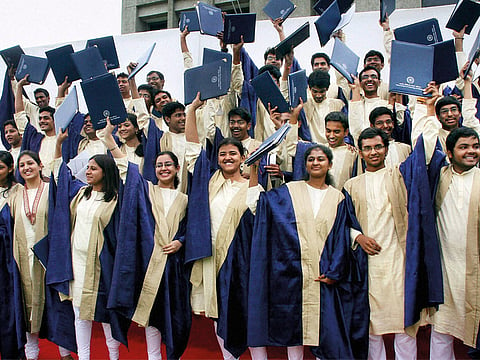Closing the skills gap
New courses at Indian universities prepare students to address future challenges

An unprecedented expansion as well as improvement in India’s higher education sector has ensured the best talent find jobs easily anywhere in the world. This is largely because institutions that produce quality work are no longer restrained. They are competing with international educational market playing fields. In fact, the sector is moving away from theoretical learning to industry-focused studies, encouraging innovation, especially concerning human lives and health.
A case in point is Archit Agarwal, a B.Tech student in electronics engineering from the University of Petroleum and Energy Studies, Uttarakhand, who has developed a unique black box. This low-cost device can be fitted below the steering wheel and the dashboard of a vehicle to alert the emergency services at the time of any accident. Apart from sending the location of the vehicle to the emergency services, the device can also help automobile and insurance companies to track the vehicle’s real-time data to settle accident claims.
Several such innovations are the result of techno-managerial education that creates an ecosystem of highly skilled professionals. Following a modern pattern of training, Institute for Future Education, Entrepreneurship and Leadership (IFEEL) in Pune, Maharashtra, has developed programmes that focus on practical exposure to theoretical teaching.
Dr Raja Roy Choudhury, Director, IFEEL, says, “Whether it is determining credit risk, developing new medicines, finding more efficient ways to deliver products and services, people need to know how to harness the benefit of technologies.”
Technology management
As businesses move away from gut-feel based decisions to data driven decisions, IFEEL’s future programmes in IT such as big data and analytics, which encompasses artificial intelligence, machine learning and cloud computing, will help students familiarise with multi-platform fluency and have real-world experience with the most important tools and platforms.
“With cloud making a huge difference to IT careers, there’s huge surge in the hiring rates of job professionals with cloud skills,” Dr Choudhury explains, adding, “Cloud computing has countless career opportunities including cloud architects, cloud developers and cloud security specialists.”
Government plans
Interestingly, while India is just beginning to experience and take advantage of new age technologies that are expected to create a lot of jobs, the policy think tank of the government, National Institution for Transforming India or Niti Aayog, is looking at blockchain to help boost the country’s ease of doing business rankings. But at the same time, with science-led global growth in agriculture contributing immensely for providing food, feed and fibre for the ever-increasing population, another major challenge today is to enhance food production by increasing substantially the productivity rates in a highly variable environment.
More from less
Professor Kailash C Bansal, former director, National Bureau of Plant Genetic Resources — Indian Council of Agricultural Research, and Senior Fellow, TERI-Deakin Nano-Biotechnology Centre in Gurugram, Haryana, says, “We need to produce more from insufficient essential resources like water and nutrients and limited land tracts.”
This necessitates more output with less input, particularly when there is demand for doubling farmers’ income. “Thus, a course on Nano-Biotechnology, which involves innovations in natural and bio-resources use, is advisable for students to focus on.” The course is offered at TERI-Deakin Nano-Biotechnology Centre at Gurugram and at other leading universities like Tamil Nadu Agricultural University, Coimbatore.
The scientist also suggests a new course on gene editing at the centre focuses on understanding the natural genetic variation and incorporating novel useful traits from unutilised genotypes of crop species for sustainable agriculture. “The contemporary new plant breeding techniques including CRISPR-Cas mediated genome editing tools hold a great promise in developing improved and climate resilient crop varieties and hybrids,” he says.
Courses in specialty agriculture, soil health management, and protected horticulture can be useful for students looking to build careers in agriculture and its associated field, he says.
With new opportunities beckoning in the arena of higher education, premier institutes in India have created a distinctive image across the globe. They will only become more valuable and prepare students to be effective drivers of new ventures and stable economies.



